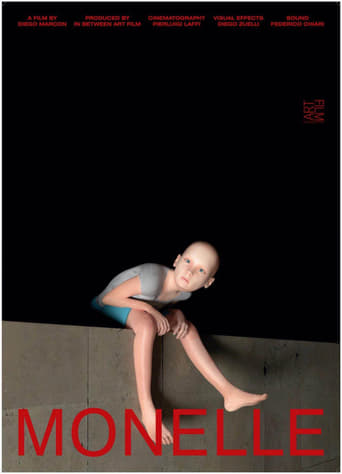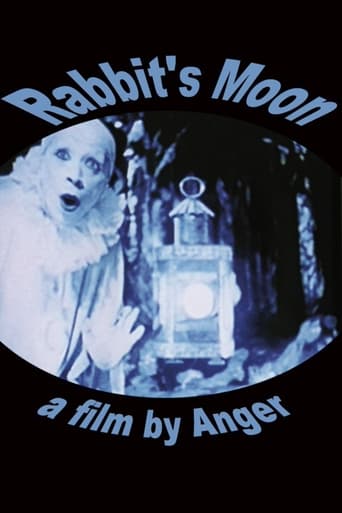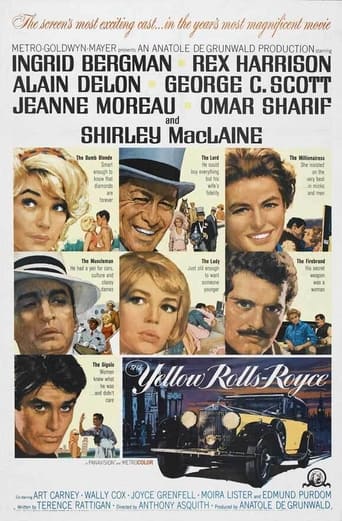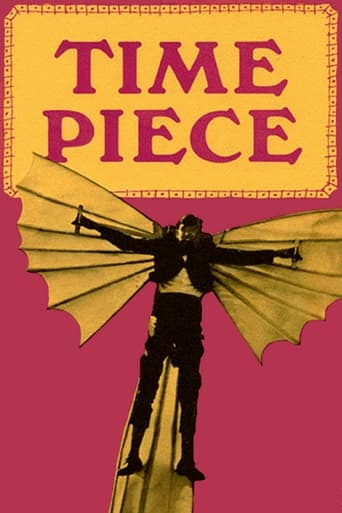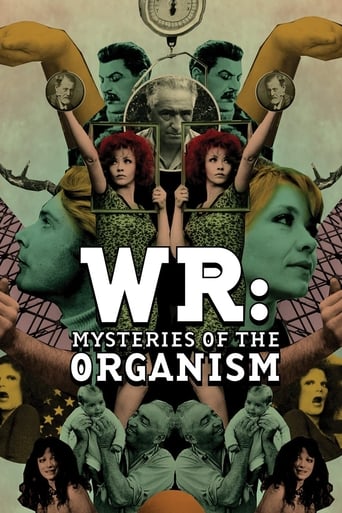

WR: Mysteries of the Organism (1971)
What does the energy harnessed through orgasm have to do with the state of communist Yugoslavia circa 1971? Only counterculture filmmaker extraordinaire Dušan Makavejev has the answers (or the questions). His surreal documentary-fiction collision WR: Mysteries of the Organism begins as an investigation into the life and work of controversial psychologist and philosopher Wilhelm Reich and then explodes into a free-form narrative of a beautiful young Slavic girl’s sexual liberation.
Watch Trailer
Cast
Similar titles
Reviews
Instant Favorite.
Don't listen to the negative reviews
This movie was so-so. It had it's moments, but wasn't the greatest.
This movie feels like it was made purely to piss off people who want good shows
First, in a documentary type format, the movie has us listen to the writings of a radical free thinker, Wilhelm Reich (WR), and his followers who believed in his teachings that sexual liberation and the power of the orgasm can release healing properties and a higher consciousness. We watch odd experiments with psychology patients and listen to interviews with psychologists. We later learn how WR was imprisoned for his ideas and died in prison. His writings were banned and burned by the American legal system. We also watch a plot-based storyline highlighting two characters in Yugoslavia. One, a sexy brunette whom we meet in the midst of a long intercourse session with a "comrade." She may have a couple of lines, but basically her role is as the roommate who is very sexually active. The other lead is redheaded Milena who proclaims loudly that all should be liberated from sexual repression. She has an image of Reich hanging in her apartment as well as one of his "orgone machines" which we've learned unleashes sexual energy for health reasons. (I swear I saw one of these machines in a Woody Allen movie, but I can't place it.) We can assume that Milena is a follower of Reich's teachings, and the storyline allows us to witness her attempt at raising awareness to sexually liberate those around her. Did I mention that Reich wrote a book on how fascism is a symptom of sexual repression? Ironically, Milena does not have much sex in the movie. She is more the idealist. She does, however, attempt to love a Russian skater who calls himself "The People's Artist." He is in costumed regalia when we meet him and seems oblivious to Milena's advances. Eventually she wins him and he is so shocked by his feelings that he cuts off her head with his skate. He then laments with a song. Not to worry though because Milena lives on as a talking head.Interspersed between the documentary and storyline are images of Stalin in all his glory with troops and flags, videos of water-boarding and electric shock experiments on patients, interviews with an artist who makes casts of erect penises, and interviews and video clips of a transvestite walking the streets, among others. My favorite are clips of a man (Tuli Kupferberg of The Fugs) who dresses himself in flamboyant soldier garb and walks populated streets in the U.S. Other clips and their references are lost on me. Rosenbaum delineates some of them in his essay, including some references to songs, bands and artists.The Russian skater is alienated from his true self, that of a human capable of loving and procreating. This unnatural state, which Milena is trying to make him aware of, is like the repression of the working class, which political systems, such as Stalinism, attempted to force awareness on the people.Exposing the mechanisms perpetuating a system of repression does not lead to rebellion, it leads to death. We witness the idealism of Reich result in his persecution; the advances of Milena to liberate the Russian skater from sexual repression result in her beheading; the grandeur of Stalin resulting in painfully hideous and difficult to watch experiments on the people (and, as we know, the deaths of millions.)It's as if our denial of the system cannot be told to us – it must manifest naturally. The rebellion against the class system must be done intrinsically, of one's own realization and doing. Preached ideals rarely result in overwhelming rebellion from the bottom up. Most choose the blissful ignorance of the blue pill, leaving men to patrol the streets from, what? (cue scenes of Tuli Kupferberg walking populated US streets in full soldier garb, with weapon, as people either ignore him or are mildly amused. The Fugs' "Kill for Peace" is playing and the scene ends with Tuli stroking his weapon.)Perhaps my conclusion is tainted, being that I am looking back on this movie decades later, knowing the results of the 60s sexual revolution, Stalinism and the cold war. I do believe that one leaves this movie a bit disheartened. Some visuals leave lasting impressions such as Reich's works being incinerated, or our heroine, Milena's, decapitated head after attempting to free the Russian skater from a loveless life. Her voice lives through a talking head, as do Reich's in the footage shown, but what of those who accept their plight, unaware of their need for liberation? Will the rebellion ever manifest? Will love and the power of the orgasm uproot the underlying mechanisms that Marx claims requires an uprising? What have we learned since then?amovieacountryajourney.com
Silly me I suppose. I had no idea what I was in for. I knew nothing about the movie and it caught me off guard.At first I though this was being one of those artistic documentary like movies, in which a whole bunch of people are having deep thoughts about life and happiness. It took me a while to realize that it were all characters in this movie and it wasn't being a documentary at all. It's more a sort of satire and if you take it that way this movie is being pretty bearable and good enough for what it is.Not that this movie is just for everybody though. It's the sort of cheaply made artistic movie, that's filled with metaphors and doesn't necessarily following a main plot line in it. Some people will hate it, while others shall absolutely love it. I was stuck in the middle somewhere.Thing I liked about this movie is that it's also being the sort of movie that makes you think. It makes you think about what you're seeing and what the characters in it are trying to tell you with their actions and pieces of dialog. It's probably true that you could keep watching this movie over and over again and get more- or completely different things out of it, each time you watch it.But it's still not my cup of tea. It's being a bit too vague and odd all at times and most of its themes don't even feel all that relevant anywhere in today's world and present morals and standards. Perhaps you should look at it more as a period piece, from a time when there still was sexual repression and communism and capitalism still seemed like a real threat to the world.Still a great watch for some people. Just not for me.6/10 http://bobafett1138.blogspot.com/
Not sure why I kept watching except maybe hoping it would get better.. but instead it couldn't find an ending for itself. There is no way the film had a shooting script to start with, merely lots of poor quality black & white film to splice together incoherently. To make it even more tedious there are white subtitles against white backgrounds in at least 90 per cent of the footage. The "comedy" is nonexistent but primal screaming, wailing, bogus techniques of healing are all there to make you squirm. Imagine that in 15 consecutive minutes you see: shock therapy, scream therapy, ice skating, Stalin, a mentally ill person banging his head against a wall, a plaster cast penis & a talking head without a body!! This film has to be a joke..if you took it seriously you must be on drugs while you watched it. Pretentious, amateurish, and trust me on this--a complete waste of approx 1.5 hrs that you could have been getting some sleep. By the way, did this director sleep with the director of Night Train to Venice?
WR is not exactly a full-blown "perfect film". It is, without a doubt, one of the most in-your-face forms of personal, artistic and political expression put out in the period. Only Godard can be compared for something as demanding and daring as W.R., but even then there could be compromises due to his penchant for drawing out the facet of the cinematic essay. Writer/director Dusan Makavejev goes fearlessly into making a hybrid of documentary and fiction, where one sees a truly raw form take place in how he places his camera on subjects and on locales, and an attitude of recklessness in how he edits together the fictional segments (a free-love inspired communist Yugoslavian meets a more uptight male ice skater and fall somewhat in a kind of love surrounded by semantics) with archival footage and the documentary. It's this same reckless quality and adherence only to throw out any typical narrative that makes W.R such a crazy milestone in the avant-garde (which, by the way, Makavejev says is only relative to other films). He could have just made a serious work about the writer/sex therapist Wilhelm Reich, or a romantic drama about two differing sides of the personifications of communist ideas played out, but he's discontent with making either or and does both, and more. It's a film of its time, but not trapped in it.One of the best things that also comes out right away from W.R. is that it is, in the tradition of another cinematic anarchist like Godard, a full-blown satire. This is essential because without this spirit of mocking and criticizing the very things that Makavejev is praising (i.e. Leninist and Stalinist propaganda footage is inter-cut with footage from what must be committed folk at an asylum getting electroshock and knocking heads against the wall), the film would very quickly become preachy and didactic, and might have actually been more-so accepted by the Yugoslav censors. It's the very act of humor about it all, of having sex as if in a kaleidoscope put to dry narration, or the crazy bearded guy with a helmet carrying around a gun and sometimes giving it a 'good time, or how some weird drunken neighbor literally crashes through the wall of the communist girl's apartment while he and the ice skater talk politics and her (very naked) friend does leg exercises, that makes it on the surface seem so outrageous.And believe-you-me, it didn't get the "Luis Bunuel award" at Cannes for nothing! Going between a gay guy telling about his prime sexual experiences to seeing women and men in the throws of Reich's 'method' of releasing pent up tensions (this may be the only repetitive portion of the film, not s shocking to anyone who's seen any given episode of HBO's Real Sex, albeit for the period it's quite absorbing), and then back to Reich's theories that were crushed and burned as he died in a prison, and then back again to the Yugoslav 'love' story that ends with a few image that Jodorowsky might wince at.And as this is all going on, Makavejev doesn't let the audience stop thinking, either. Behind a sequence like when Milena riles up the men in the building complex to have a free and healthy attitude towards communism is some truth, contained within what is obviously a parody of communist propaganda films are points that the viewer has to take into account, or at least to fill in some blanks as the film goes forward.The lack of structure then, in a sense, is structured as such, and it becomes an act of participation to guess what might come next, of what might be either informative- like the history of Reich as writer and controversial figure, almost by bad luck, or about the delirious technique of the 'box' used by Reich on his patients- or entertaining, in ways that only a provocateur can handle. Now, take this as a fact, know what you're getting into before you seek out the Criterion DVD. It's quite a graphic film in terms of showing full on sex, aroused genitalia, and sometimes not in always the playful manner intended. But it's not simply that to look out for, though even by today's standards it's a bit surprising. What makes W.R. such a unique and warped bird of art is how it challenges the viewer, provokes fully if not discussion then some kind of collision of intellectual and visceral reaction for those who at least meet the filmmaker halfway. Once in a while frustrating, but never ever boring, W.R. is a cinematic shock from a go-for-broke iconoclast.



